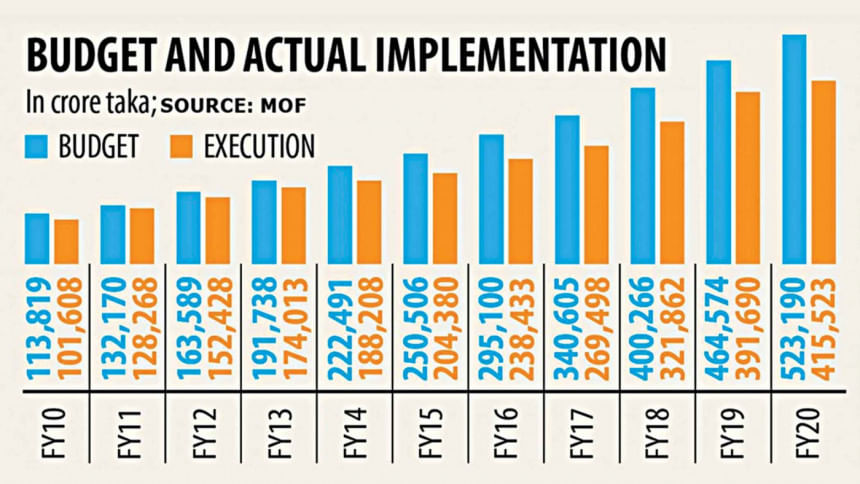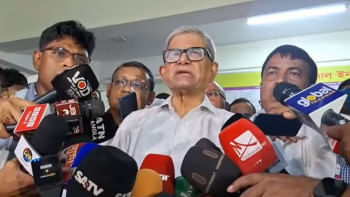A budget is only as good as its implementation

As another proposed national budget (of Tk 603,681 crore) has been placed in the parliament amidst a global pandemic, the biggest concern for the government and all other stakeholders is how well it can be implemented, as there are many new challenges to tackle. The aspirations of the budget—especially the economic growth target of 7 percent—are already being viewed by many as ambitious, and we must keep in mind that the budget will not yield a positive result for the nation unless the government takes immediate measures to ensure its adequate and timely implementation.
According to a recent report by The Daily Star, the implementation rate of the national budget has fallen over the last decade, compared to the implementation rate of the fiscal year 2010, when the rate was 89 percent, and FY 2011 when it stood at 97 percent. In FY 2020, it went down to 79.4 percent.
Experts attribute this decline to a number of factors including weak governance, rise of corruption, increasing inefficiency, a lack of accountability as well as a lack of capacity building. And this case of low budget implementation has been amply demonstrated by the performance—or lack thereof—of the Health Services Division.
According to a report released in April this year by the Implementation Monitoring and Evaluation Division of the Planning Ministry, in FY 2020-21, the Health Services Division was allocated a fund of Tk 11,979.34 crore, of which it utilised only Tk 2,515.54 crore—around 21 percent of its ADP allocation—in the first nine months. By contrast, other ministries exhausted an average of around 41 percent of the ADP allocations during the same time.
While some suggest that the fall in budget implementation in FY 2020-21 has been low due to constraints placed by the ongoing pandemic, the shoddy performance of the Health Services Division in utilising the ADP fund has been particularly visible and disconcerting, especially as the healthcare system crumbled under mounting pressure from the second wave of Covid-19 in 2021.
The director general of DGHS, Dr ABM Khurshid Alam, has told the media that this low budget implementation has been the result of a massive engagement of the division in battling the pandemic. But one might be pardoned for asking, why was strengthening the healthcare sector not prioritised amidst a pandemic? If that had been the case, then the concerned division would have made sure to deploy necessary manpower and resources to build the capacity of the healthcare sector. And why, in March and April this year, did we face the acute crisis of ICU beds and oxygen cylinders in Dhaka and Chattogram, the two major cities? Why is the healthcare system in border districts—where there has been a surge in Covid-19 infections recently—in such a pathetic state, with few or no ICU beds and frighteningly low supply of oxygen cylinders?
At the peak of the second wave, familiar images of people scrambling to find healthcare support to protect their loved ones resurfaced. Every day, there had been reports of how people were succumbing to the virus due to inadequate medical facilities. Had adequate measures been taken on time and the ADP budget allocation utilised properly for the development of the healthcare sector, this repetition of the public's misery could perhaps have been prevented.
While discussing the issue of the falling budget execution rate with this writer, noted economist and executive chairman of the Power and Participation Research Centre (PPRC), Dr Hossain Zillur Rahman, referred to the problems that are contributing to the deterioration in the budget implementation rate: "In the past, it was generally thought that low-paid bureaucrats didn't get enough incentives to drive this. So we tried to solve this through providing incentives, by increasing their pay and benefits. But this approach apparently didn't work. Secondly, there was also talk of capacity building. One type of capacity building activities is taking training abroad, which can help in acquisition of technical skills. But this doesn't seem to have worked either. There is no dearth of foreign trainings, but their outcome is not being reflected in the performance of the officials."
He added: "So we can say that the approach to incentivise the bureaucrats has not worked. These isolated skills acquisition measures have not worked. The key issue here is the political governance of implementation. It is here that we have to search for answers."
Dr Rahman, who is also the chairperson of the governing body of BRAC, further suggested that lack of professionalism as a result of weak political governance has amplified the problem. "Professionalism has not been developed to the extent expected. Proper political governance nurtures professionalism and creates an appropriate system. Since both transparency and accountability of political governance have become weaker, a section of the bureaucrats have increasingly found it convenient to indulge in corruption and in creating a distance from the people. This is a major problem. Without addressing the weaknesses of the political governance system, we will not be able to find a solution to this problem."
In addition to these, bureaucratic entanglements—in the forms of lengthy processes and approval times—which often work as impeding factors in the timely release of funds should also be streamlined for the effective execution of the budget. And the monitoring mechanism of budget execution needs to be strengthened, too, to improve transparency and ensure accountability of the officials. Otherwise, factors such as corruption would keep on plaguing our budget implementation scenario, aggravating the sufferings of the common people and thwarting the development goals of the government.
It is the system that is problematic, and the system needs to be re-set for it to work properly and to flush out the dirt.
Every year, before and after a budget is proposed and passed, we debate on the size of the budget, how the funds should be allocated to different sectors, what their aspirations should be, etc. We delve deep into the details, dissecting each element, each allocation, to assess and predict the effectiveness of the budget. While these are all important issues, we also should focus on the importance of budget execution. After all, what's the point of having a budget if it remains largely unimplemented? Since budget implementation has registered a declining trend in recent years, we must gear up our efforts to contain this, and we must do it now.
Whether a budget is well-balanced or too ambitious, it all comes down to how well it is being managed, because a budget is only as good as its implementation. Given that we are still in the middle of a health crisis, which has had enormous impacts on the lives and livelihoods of the people, utilising the budget wisely and efficiently is more crucial than ever before.
Tasneem Tayeb is a columnist for The Daily Star.
Her Twitter handle is: @tasneem_tayeb

 For all latest news, follow The Daily Star's Google News channel.
For all latest news, follow The Daily Star's Google News channel. 



Comments